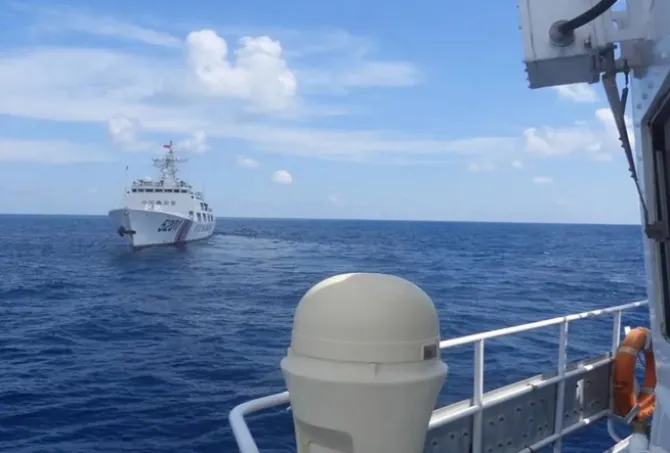
From harassing Philippine Coast Guard (PCG) resupply missions in Philippine waters and announcing its “10-dash line” map to setting up a floating barrier near the Scarborough Shoal in September, China has been increasing its provocations against Manila’s sovereignty and sovereign rights in the West Philippine Sea. Such assertiveness by China must be understood in the context of Beijing’s broader ambitions for the maritime domain. China seeks to deepen its sphere of influence in the greater South China Sea by operationalising a de facto regional exclusionary policy against Southeast Asian countries like the Philippines as well as extra-regional powers. It is important to note that the greater South China Sea forms a geographic shield for China against the strengthening position of the United States (US) in the region. It is, thus, crucial for Beijing to not only militarise it but to also consolidate its hard presence in the maritime space to box the US alliance network out of the strategic waters.
China seeks to deepen its sphere of influence in the greater South China Sea by operationalising a de facto regional exclusionary policy against Southeast Asian countries like the Philippines as well as extra-regional powers.
In this light, the Philippines holds an undeniably important geopolitical position as a key maritime Southeast Asian country lying at the intersection between the traditional sphere of US influence and the burgeoning locus of Chinese power. However, under the current administration of President Ferdinand Marcos Jr., Manila has been showing more determination to stand up for its sovereignty and sovereign rights. For the longest time, China was used to a reactive and even constrained Philippine position towards its sovereignty and sovereign rights in the West Philippine Sea. However, the Philippines of today is clearly not the Philippines of the past few years and decades. Manila is illustrating its steadfast desire to proactively address China's salami slicing by not only relying on traditional security methods but also by incorporating novel strategies that bank on broadening the utility of its expanding defence network; using international media to publicise Chinese belligerence; overtly upholding the principles of the United Nations Convention on the Law of the Sea (UNCLOS) and the 2016 Arbitral Ruling; most importantly, demonstrating the desire to inch closer towards a whole-of-a-nation approach. Amidst the contemporary geopolitical turbulence in the region, the Marcos Jr. administration recognised the need to establish a systematic and objective security strategy to serve as a clear-cut and pragmatic framework for the Philippine government to implement for the next few years. Such realisations have come at a time when China has reinvigorated its assertive posturing in the West Philippine Sea. Such actions by Beijing are now being read by Manila as the former’s unwillingness to facilitate conditions for inclusive and equitable negotiations and cooperation.
The Philippines holds an undeniably important geopolitical position as a key maritime Southeast Asian country lying at the intersection between the traditional sphere of US influence and the burgeoning locus of Chinese power.
It is precisely due to the tumultuous regional backdrop that the Philippines’ National Security Policy (NSP) 2023-2028 was released in August. The document is undoubtedly one of the most fundamental guidelines that will steer Philippine security policy in the years to come. More importantly, in the latest NSP, the West Philippine Sea was highlighted as “a primary national interest” given that other claimant countries have constantly renounced the 2016 award that ruled in favour of Philippine interest, sovereignty, and sovereign rights. In this regard, the new NSP also emphasised how, among the plethora of security issues that challenge Philippine interest, the threats to national sovereignty and territorial integrity remain on top, leading to “defence and military security” as the primary agenda of the government. Accordingly, a whole-of-a-nation approach was also highlighted in the NSP to improve coordination between and among critical agencies such as the PCG and Philippine Navy (PN) and other government agencies to forge a multi-faceted approach in addressing emerging challenges to Philippine sovereignty and sovereign rights. In fact, the Philippine Senate has also adopted a notable resolution condemning China’s actions in the West Philippine Sea. Moreover, the National Security Council (NSC) is also set to release a new Philippine standard map to emphasise the country’s legitimate claims based on UNCLOS and the 2016 ruling. Furthermore, the Philippine Senate has also begun the hearing for a proposed Maritime Zones Bill to strengthen Manila’s maritime claims by declaring the country’s maritime zones based on the objective standards set by UNCLOS. It is in this light that China is trying to gauge how far it can go to achieve its strategic interests at the expense of Philippine sovereignty and sovereign rights without triggering a shooting war by virtue of the security guarantees under Philippines’ alliance with the US. Given that China is also aware of its military limitations, it seeks to slowly alter the status quo without the heavy strategic military risks. Being a very calculative power, China will first have to navigate its policy choices given an ongoing empirical evaluation of the responses to its recent provocations, once it has figured out some sort of basic formula it can replicate and operationalise given the shifts on the ground.
The National Security Council (NSC) is also set to release a new Philippine standard map to emphasise the country’s legitimate claims based on UNCLOS and the 2016 ruling.
However, as the Philippines becomes more politically aware towards knowing where to draw the line between accommodation and the protection of its national interest, it must continue to pursue broader strategies to address China’s growing assertiveness. While improving its national security capabilities and external defence networks is crucial at a time of great geopolitical uncertainty, Manila must also remain unequivocal in spearheading robust economic partnerships. China’s power projection capabilities are deeply rooted in its expanding economic clout. It has often weaponised its asymmetric trade ties with its East and Southeast Asian neighbours as a means to a geopolitical end. As of July, China is the Philippines’ top export destination and import source. While the Southeast Asian country’s top export destination has been shifting over the past few years, China’s formidable position as a top import source remains worrying given that the Philippines is a net importing country. Thus, Manila is aware of the socio-economic perils of abruptly diversifying its imports away from cheaper goods from China at a time when inflation rates are troubling. Therefore, as the Southeast Asian country continues to strengthen defence ties with like-minded countries, it must also broaden the scope of its partnerships towards the economic realm as well. By forging more inclusive and equitable trade agreements with its partners, there is a chance for the Philippines to slowly lessen its import dependency from China, thus creating more strategic flexibility.
While improving its national security capabilities and external defence networks is crucial at a time of great geopolitical uncertainty, Manila must also remain unequivocal in spearheading robust economic partnerships.
As the Philippines continues to improve its diplomatic relations with like-minded countries across the Indo-Pacific and Europe, it is in the position to leverage these expanding relations to pursue its security and economic interests more effectively at a time when China has been seeking to cement its strategic footprints in the West Philippine Sea and the greater South China Sea. Therefore, it will be crucial for Manila to harness a consistent political will towards pursuing its national interests. Given that Beijing has both time and money in its hands, it will be seeking to exploit any inconsistency in the Philippines’ reinvigorated security and foreign policy outlook.
Don McLain Gill is a Philippines-based geopolitical analyst, author, and lecturer at the Department of International Studies, De La Salle University (DLSU).
The views expressed above belong to the author(s). ORF research and analyses now available on Telegram! Click here to access our curated content — blogs, longforms and interviews.




 PREV
PREV


